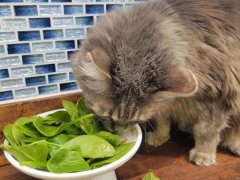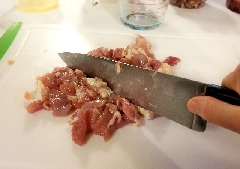
Kirsten McCarthy / Cats.com
Just like humans, cats need regular food and water to survive. If they go too long without one or the other, it can be very dangerous and even deadly. However, cats’ appetites can change throughout their life as they grow older, when they’re unwell, stressed, or if they don’t like their food.
Sometimes cats can stop eating altogether if they are suffering from illness or disease. Cat owners may wonder, how long can a cat survive without food? The answer isn’t a straightforward one and we’ll discuss this in more detail now.
Cats can survive typically for 1-2 weeks without food, but should never go without food for 24 hours. A cat that is not eating needs to be taken to the veterinarian to see if an underlying health condition may be the cause. There are a number of tips and tricks that can help cat owners encourage cats to eat, such as providing the right food for the individual cat and placing plenty of food and water resources around the home.Key Takeaways
How Long Can Cats Go Without Food?
The simple answer to this question is that cats may survive without food for 1-2 weeks as long as they have access to water. Cats will only survive approximately 3 days without drinking water.
However, this isn’t always the case and cats may not survive this long without food and water. This depends on the cat’s health, age, breed, and environmental conditions. For example, an older cat with underlying kidney disease living in a very cold climate, likely won’t live very long at all without food and enough water.
Even though cats can survive without food for 1-2 weeks (and many feral cats may do so), it is never recommended to allow them to. Always seek veterinary attention and if you’re going away, hire a cat sitter or use a cattery.
Along with causing undue suffering and stress and being potentially fatal, going without food for a long period of time is harmful to a cat’s body, and it has consequences.
What Does Starvation Do to a Cat?
A cat may survive without food for 1-2 weeks but doing so has dire consequences. After 3-4 days without eating, cats start to suffer from disease. As their protein becomes depleted, their body starts to break down fat which leads to an accumulation of fat in their liver. This is called hepatic lipidosis/fatty liver and leads to liver failure.
Cats that become dehydrated, from a lack of food and water, often develop kidney failure and multi-organ dysfunction. Certain underlying health conditions such as chronic kidney disease, diabetes, and hyperthyroidism can predispose cats to dehydration.
Even if cats survive starvation or dehydration it still often leads to health problems. These can include malnutrition, weight loss, and medical issues (e.g. residual kidney disease).
When Should You Bring Your Cat to the Vet?
As we’ve established a cat may survive without food for 1-2 weeks but can develop serious life-threatening consequences if they haven’t eaten for 3-4 days. However, a cat should never be in a situation where they are without food for this long.
If your cat hasn’t eaten for over 24 hours, take them to their veterinarian. Even if they’re drinking and seem to be in good spirits, there could be something seriously wrong. Your vet will examine your cat and possibly perform some blood work and imaging (x-rays, ultrasound). Earlier intervention and treatment may save your cat’s life.
What Causes Cats To Stop Eating?

Like people, cats may stop eating for a variety of reasons, from underlying health issues to stress. Kirsten McCarthy / Cats.com
There are many reasons for a cat to stop eating and none of them should be ignored. Cats that aren’t eating can go downhill very fast so it’s important to find out why they aren’t eating.
Reasons for inappetence (loss of appetite) include but aren’t limited to;
- Stress – Cats that are severely stressed are unlikely to eat normally, if at all. Potential stressors include a new baby in the home, a new cat, or a house move. Cats that are stressed may have a change in appetite but also behavioral changes. These behaviors include being withdrawn, hiding away, and even aggression.
- New food – This is a very common cause. Many owners have bought a different brand of cat food at the shop if the regular food isn’t in stock. This is something that can’t be helped sometimes but it can cause illness in cats. Cats are sensitive to diet change and commonly suffer gastrointestinal upset if their diet is changed suddenly. If the ingredients are different from the previous diet, they may also have allergies to new ingredients.
- Illness – Cats that are suffering from any sort of inflammation or infection may stop eating, particularly if they have a fever (high temperature). This may be caused by anything such as a tummy bug (gastroenteritis), a cat bite, an abscess, or a virus.
- Disease – Underlying diseases such as chronic kidney disease, hyperthyroidism, diabetes, urinary tract disease, and pancreatitis all have the potential to make your cat very unwell and to stop eating.
What Causes Reduced Appetite in Cats?
Along with the above reasons, certain factors may cause a cat to still eat but have a reduced appetite, such as;
- Dental pain/disease – If cats are in pain with a sore mouth, they’re unlikely to eat as much food as they did before.
- Inappropriate bowls – Cats dislike steel, reflective, deep bowls and may not eat as much from a bowl like this.
- Dirty bowls – Cats are super clean and may avoid using dirty, soiled food bowls. Along with this, they can pick up bugs from dirty bowls.
- Location of food bowl – If their food bowl is located in a busy place in the house or near other pets, they may not be able to access their bowls, particularly if they’re nervous or anxious.
- Feeding frequency – If you feed your cat large portions once or twice daily, they may not be able to eat all of the food in one sitting. Their stomachs are relatively small and they like to eat little and often.
- Recent vaccination – Many cats will be temporarily off form for 24-48 hours after their vaccination and this may include a reduced appetite. You should ring your vet if this occurs.
How to Encourage Your Cat To Eat

Cats are sensitive to dietary changes and may have a reduced appetite if they are not happy with a new food. Kirsten McCarthy / Cats.com
Many causes of inappetence in cats need veterinary treatment. This may include intravenous fluid therapy, antibiotics, and pain relief. Along with this (with your vet’s go-ahead), you can encourage them to eat in a few ways.
Use wide, shallow ceramic bowls to feed your cat. Offer multiple bowls in different quiet parts of the home that are easy to access for your cat. If you have multiple pets in the home, make sure that there’s no competition for food bowls and provide plenty of resources (food and water bowls, litter trays, scratching posts, and beds) for the number of pets that you have.
In the wild, cats would have eaten several small portions of food throughout the day. Pet cats are similar and prefer to eat little and often. Feed your cat smaller portions 4-5 times daily. Offer lots of wet cat food if your cat will eat it, as this provides high moisture content and will prevent dehydration.
If your cat eats dry food, leave it out in a bowl for your cat to graze on throughout the day. Cats that eat predominantly dry food, will need to have plenty of water bowls and fountains available to prevent dehydration.
If your cat is currently off their food, you can try to heat up the food to bring out the natural aromas that may appeal to your cat’s appetite!
Avoid giving any human or cat medication that you have at home to treat your cat’s inappetence. Many human medicines are toxic to cats and even some cat medications are harmful to give to cats when they have an underlying disease or are dehydrated.
Final Thoughts
A cat can survive without food for 1-2 weeks, but you should visit your vet if your cat hasn’t eaten in 24 hours. Cats can become extremely sick if they haven’t eaten within 3-4 days. They can even go into liver failure as a result.
If your cat has a reduced appetite or has gone off their food they may have an underlying illness or disease and need the correct treatment to get them back to themselves. Early treatment is key to a positive outcome.
Frequently Asked Questions
What happens if a cat doesn't eat for three days?
Cats that haven’t eaten for 3-4 days are at risk of fatty liver/hepatic lipidosis. This is when the body begins to break down fat for energy and this accumulates in the liver. This needs urgent veterinary diagnosis and treatment.
Can cats survive 24 hours without food?
Yes cats can survive 24 hours without food. This is an alarm bell that something is up with your cat. They may be unwell and you should book an appointment with your veterinarian as soon as possible.
How long can a cat survive without water?
Cats can survive approximately three days without water if they’re healthy and well otherwise. Cats that are older or have an underlying disease such as chronic kidney disease, may not survive as long.
How long can a cat survive starvation?
Cats may live for 1-2 weeks without food, as long as they have access to water. They can suffer liver and other organ damage as a result of starvation and dehydration. This may lead to long term effects.







